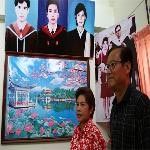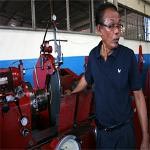
Many of the so-called Red-Shirt protesters who have spent more than two months demonstrating against the government on the streets of Thailand's capital come from the country's rural poor and urban working class. But in the Red-Shirt stronghold in Thailand's northeast, many wealthier Thais also back the movement, and they worry about the violence unfolding in Bangkok.
Housewife Uraiwan Suwannasang lives a comfortable life. Her home in the northeastern town of Ban Pheu is filled with trophies and large photos of her three children, all university graduates working in the United States.
Uraiwan and her husband Teerapon, a retired school principal, are fervent supporters of Thailand's anti-government Red Shirts, who have occupied downtown Bangkok in more than two months of protests.
Sporadic violence has left more than 60 people dead since the protests began. More than half the deaths have been in continuing violence that began last week as the government began efforts to clear the Red Shirts camp in central Bangkok.
Many of the Red Shirts come from Thailand's northeastern Isaan region, a dry, rural area that is poorer than the rest of the country. But Uraiwan and her husband are not poor.
Uraiwan says she had never had much interest in politics until the 2006 coup that overthrew Prime Minister Thaksin Shinawatra.
Much of Mr. Thaksin's popularity comes from policies such as cheap healthcare and rural loans, which helped many farmers escape poverty. But Uraiwan says she was too wealthy to benefit from that.
She says her support for the Red Shirts is about justice and fairness, although she also says raises for teachers under Mr. Thaksin made her family's life easier.
Thailand's political crisis is often simply characterized as a fight between poor rural Red Shirts and a government led by a royalist, wealthy elite. But it also has a regional dimension. In the country's south, for example, support for the Red Shirts is low, even among the poor. In the northeast, the situation is the opposite, with many middle-class people backing the movement.

At a machine shop on the outskirts of the city of Udon Thani, Narong Meephet sees Mr. Thaksin as a political hero and a business idol.
Narong employs 20 people who repair cars and tractors. He says he was too rich to benefit from Mr. Thaksin's policies. He says the Red-Shirt movement is about better economic management, and the desire of local people for more respect from the Bangkok elite.
Narong says he is a self-made man who rose up from being a poor farmer near Bangkok to owning his own business after years of hard work as a mechanic and welder in the Middle East and Japan.
He says Mr. Thaksin's real strength was in teaching people to help themselves through policies like the rural loans scheme.
Narong says he occasionally contributes between $20 and $40 to the Red-Shirt movement, but is not a major backer. He thinks around half the businesspeople in Udon Thani, many of whom are ethnic Chinese, back the Red Shirts. The other half sympathizes with their rivals, the Yellow Shirts, who oppose Mr. Thaksin.
In this region, as elsewhere in the country, many police are Red-Shirt supporters, earning them the nickname "tomatoes".

Danai Saribot is the police chief in Ban Pheu district.
He says between 60 and 70 percent of his officers are Red Shirts, but he insists they confine their political activities to when they are off-duty.
But out in the parking lot, one of his subordinates, Sakda Muthasin, walks up and talks unprompted. He says most officers back Mr. Thaksin in part because police wages rose under his government.
But he also says he is angry at the government over the deaths in Bangkok. He says if there was a nationwide crackdown, and he was asked to join, he would disobey orders. Instead, he says, he would defend the Red Shirts.
sporadic: happening only occasionally or at intervals that are not regular 偶爾發(fā)生的;間或出現(xiàn)的;陣發(fā)性的;斷斷續(xù)續(xù)的
Bangkok businesses, workers struggle as protests drag on
Thailand's political crisis edges toward resolution
Bangkok braces for unrest after govt rejects peace plan
Opposition media blocked in Thailand
(來(lái)源:VOA 編輯:陳丹妮)
